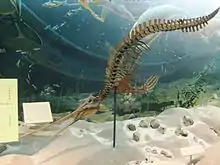Xiphiacetus
Xiphiacetus is an extinct genus of cetacean known from the Miocene (early Burdigalian to late Tortonian, 20.43 to 7.246 million years ago of Europe and the U.S. East Coast.[1]
| Xiphiacetus | |
|---|---|
 | |
| Fossil X. bossi | |
| Scientific classification | |
| Kingdom: | Animalia |
| Phylum: | Chordata |
| Class: | Mammalia |
| Order: | Artiodactyla |
| Infraorder: | Cetacea |
| Family: | †Eurhinodelphinidae |
| Genus: | †Xiphiacetus Lambert 2005 |
| Species | |
| |
du Bus 1872 described Priscodelphinus cristatus based on partial and poorly preserved skulls with extremely long and narrow rostra with a huge number of densely packed teeth. He estimated the rostrum of a large specimen to be 90 cm (35 in) long and the cranium to be 20 cm (7.9 in) long and slightly wider. He also found a series of well-preserved cervicals and a few of the anterior-most thoracics.[2]
Kellogg 1925 described Eurhindelphis bossi based on an almost complete skull missing ear bones, both mandibles, sixteen vertebrae, ten ribs, an incomplete scapula, a humerus, and a partial sternum. Kellogg named his species after its discoverer, Norman H. Boss, who had discovered the type specimen in 1918.[3] Kellogg also described several other fossils.
Lambert 2005 recombined these two taxa and placed them under the generic name Xiphiacetus.[4]
References
Notes
- Xiphiacetus in the Paleobiology Database.) Retrieved September 2013.
- du Bus 1872, pp. 497–498
- Kellogg 1925, p. 8
- Xiphiacetus in the Paleobiology Database. Retrieved September 2013.
Sources
- du Bus, B. (1872). "Mammifères nouveaux du crag d'Anvers". Bulletins de l'Académie Royale des Sciences, des Lettres et des Beaux-Arts de Belgique. 2. 34: 491–509. Retrieved 29 September 2013. Lay summary (September 2013).
- Kellogg, K. (1925). "On the occurrence of remains of fossil porpoises of the genus Eurhinodelphis in North America". Proceedings of the United States National Museum. 66 (26): 1–40. doi:10.5479/si.00963801.66-2563.1. Retrieved 29 September 2013. Lay summary (September 2013).
- Lambert, Oliver (2005). "Long-snouted dolphins and beaked whales from the Neogene of the Antwerp area: systematics, phylogeny, palaeoecology and palaeobiogeography. Les dauphins longirostres et les baleines à bec du Néogène de la région d'Anvers: systématique, phylogénie, paléo-écologie et paléo-biogéographie". Unpublished Doctoral Dissertation. Brussels: Universite Libre de Bruxelles. hdl:2013/ULB-ETD:oai:ulb.ac.be:ETDULB:ULBetd-06172005-095433. Lay summary (September 2013).